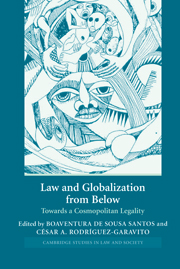Book contents
- Frontmatter
- Contents
- Notes on the contributors
- 1 Law, politics, and the subaltern in counter-hegemonic globalization
- PART ONE LAW AND THE CONSTRUCTION OF A GLOBAL ECONOMY OF SOLIDARITY
- PART TWO TRANSNATIONAL SOCIAL MOVEMENTS AND THE RECONSTRUCTION OF HUMAN RIGHTS
- PART THREE LAW AND PARTICIPATORY DEMOCRACY: BETWEEN THE LOCAL AND THE GLOBAL
- 12 Political and legal struggles over resources and democracy: experiences with gender budgeting in Tanzania
- 13 Two democracies, two legalities: participatory budgeting in Porto Alegre, Brazil
- 14 Life, life world, and life chances: vulnerability and survival in Indian constitutional law
- 15 Bottom-up environmental law and democracy in the risk society: Portuguese experiences in the European context
- Index
- References
13 - Two democracies, two legalities: participatory budgeting in Porto Alegre, Brazil
Published online by Cambridge University Press: 07 July 2009
- Frontmatter
- Contents
- Notes on the contributors
- 1 Law, politics, and the subaltern in counter-hegemonic globalization
- PART ONE LAW AND THE CONSTRUCTION OF A GLOBAL ECONOMY OF SOLIDARITY
- PART TWO TRANSNATIONAL SOCIAL MOVEMENTS AND THE RECONSTRUCTION OF HUMAN RIGHTS
- PART THREE LAW AND PARTICIPATORY DEMOCRACY: BETWEEN THE LOCAL AND THE GLOBAL
- 12 Political and legal struggles over resources and democracy: experiences with gender budgeting in Tanzania
- 13 Two democracies, two legalities: participatory budgeting in Porto Alegre, Brazil
- 14 Life, life world, and life chances: vulnerability and survival in Indian constitutional law
- 15 Bottom-up environmental law and democracy in the risk society: Portuguese experiences in the European context
- Index
- References
Summary
Today, two forms of globalization confront each other: the hegemonic neoliberal globalization driven by the interests of global capitalism, and the counter-hegemonic globalization, or globalization from below, driven by the transnationally networked resistance of subaltern classes and social groups against the exclusions, dispossessions, and discriminations caused or aggravated by neoliberal globalization (Santos 2002). I focus on the political and legal nature of the initiatives and struggles constituting counter-hegemonic globalization, which I refer to as subaltern cosmopolitan politics and legality. In this vast social field of confrontational politics and law, I distinguish two basic processes of globalization: global collective action through transnational networking through local/national/global linkages, on one side, and local or national struggles whose success prompts reproduction in other locales or networking with parallel struggles elsewhere. In chapter 2 above, I dealt with the first process, illustrating it with the analysis of the World Social Forum. In this chapter, I deal with the second process. I illustrate it with the analysis of participatory budgeting (PB) in Porto Alegre, a local initiative of social redistribution through participatory democracy considered by the United Nations as one of the most successful experiments of urban management and which has been adopted in 194 cities in Brazil and also in Latin America and Europe.
The chapter is organized as follows. In the first section, I provide the analytical framework. In the second and third sections, I present the main traits of PB conceived of as a form of participatory redistributive democracy.
- Type
- Chapter
- Information
- Law and Globalization from BelowTowards a Cosmopolitan Legality, pp. 310 - 338Publisher: Cambridge University PressPrint publication year: 2005
References
- 5
- Cited by



